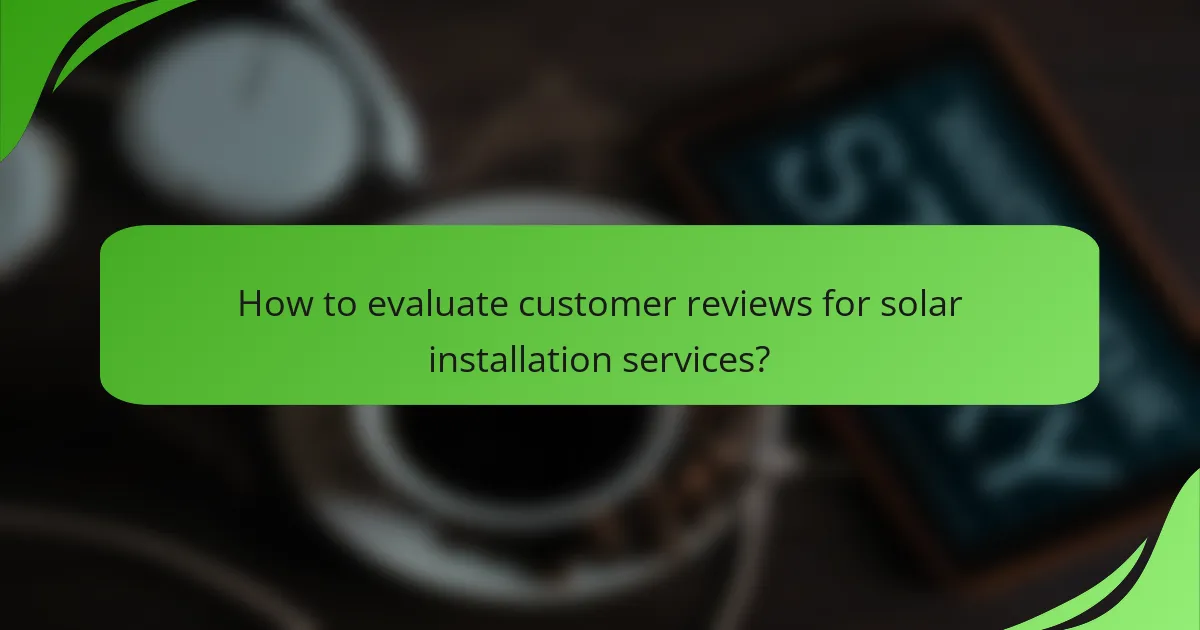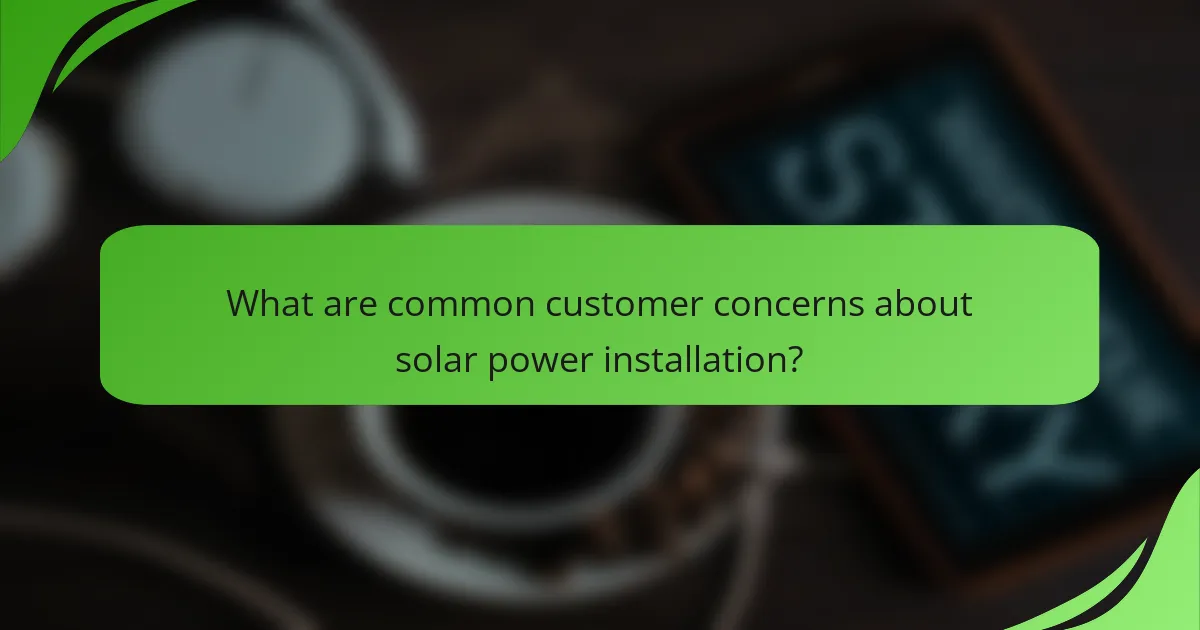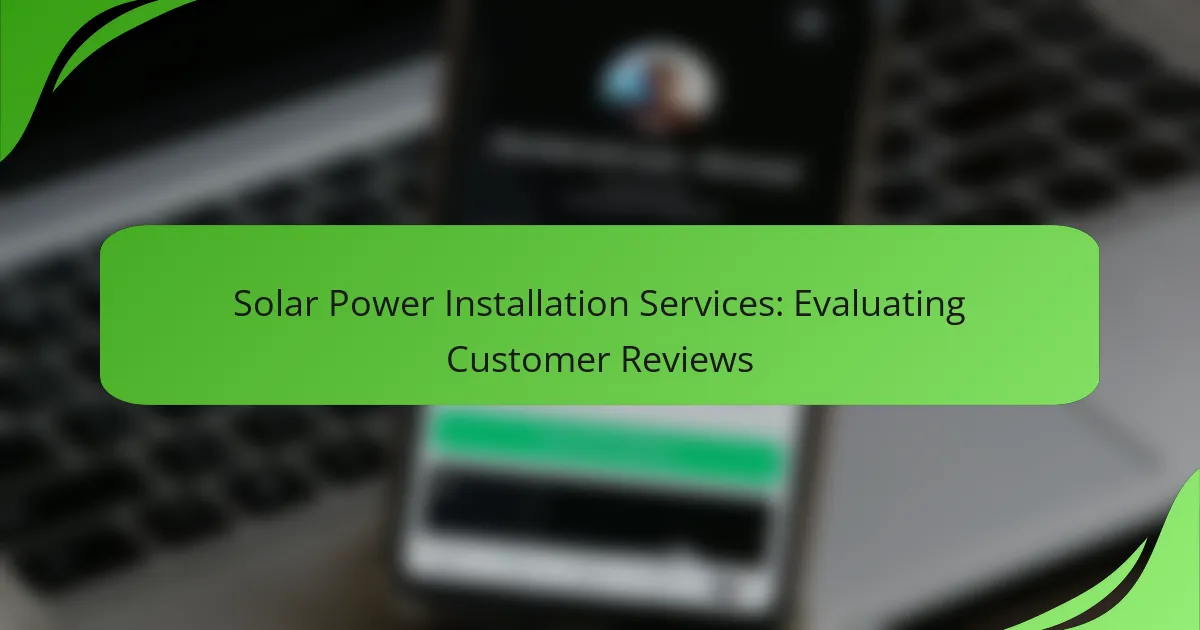When considering solar power installation services, evaluating customer reviews is essential for identifying reliable and high-quality providers. By focusing on verified feedback and specific project experiences, potential customers can gain insights into the performance, costs, and overall satisfaction associated with different companies. This careful assessment helps ensure that you select a service that aligns with your needs and expectations.

What are the best solar power installation services in California?
The best solar power installation services in California include companies known for their reliability, customer satisfaction, and quality of installations. Evaluating customer reviews can help identify which providers excel in these areas, ensuring you choose a service that meets your needs.
Sunrun
Sunrun is one of the largest residential solar providers in California, offering a range of financing options including leases and power purchase agreements (PPAs). Customers often praise Sunrun for its straightforward installation process and responsive customer service.
When considering Sunrun, look for their comprehensive warranties and performance guarantees, which can provide peace of mind. However, some reviews mention delays in installation timelines, so it’s wise to confirm the expected schedule upfront.
Vivint Solar
Vivint Solar is recognized for its innovative technology and flexible financing plans, including cash purchases and loans. Many customers appreciate the personalized service and the thoroughness of their consultations.
While Vivint Solar has received positive feedback for its installation quality, potential customers should be aware of varying experiences with customer support post-installation. It’s advisable to read recent reviews to gauge current service levels.
Tesla Energy
Tesla Energy offers solar installations that integrate seamlessly with its energy storage solutions, like the Powerwall. Customers often highlight the sleek design of Tesla’s solar products and the efficiency of their systems.
However, Tesla Energy’s installation process can be longer than some competitors, and customer service experiences can vary widely. Prospective customers should weigh the benefits of Tesla’s technology against potential wait times and service issues.

How to evaluate customer reviews for solar installation services?
Evaluating customer reviews for solar installation services involves assessing the authenticity and detail of feedback to gauge the quality of service. Focus on verified reviews and specific project details to make informed decisions.
Check for verified customer feedback
Verified customer feedback is crucial as it indicates that the reviews come from actual clients who have used the service. Look for platforms that require proof of purchase or installation, such as Google Reviews or Yelp, to ensure the authenticity of the feedback.
Be cautious of reviews that seem overly positive or generic, as they may not reflect real experiences. A balanced mix of positive and negative reviews can provide a more realistic picture of the service quality.
Look for detailed project descriptions
Detailed project descriptions in reviews can reveal important insights about the solar installation process, including timelines, costs, and customer service experiences. Reviews that mention specific aspects, such as installation duration or equipment used, help you understand what to expect.
Consider looking for reviews that detail the challenges faced during installation and how the company addressed them. This information can indicate the company’s reliability and responsiveness, which are critical factors in choosing a solar installation service.

What are common customer concerns about solar power installation?
Customers often express concerns about the costs associated with solar power installation, the performance of the systems, and the reliability of service providers. Understanding these issues can help potential buyers make informed decisions and avoid common pitfalls.
Installation costs
Installation costs for solar power systems can vary significantly based on system size, equipment quality, and local labor rates. On average, homeowners might expect to pay anywhere from $15,000 to $30,000 for a complete installation, with potential additional costs for permits and inspections.
When evaluating installation costs, consider available incentives such as tax credits or rebates, which can substantially reduce the overall expense. For instance, in the United States, the federal solar tax credit allows homeowners to deduct a percentage of the installation cost from their federal taxes.
System performance
System performance is a critical concern, as it directly impacts energy savings and return on investment. Factors influencing performance include the quality of solar panels, inverter efficiency, and local weather conditions. Most solar systems can achieve efficiency rates between 15% to 22%.
To ensure optimal performance, customers should look for systems that come with warranties of at least 25 years for panels and 10 years for inverters. Regular maintenance and monitoring can also help identify issues early, ensuring the system operates at peak efficiency.

What factors influence customer satisfaction in solar installation?
Customer satisfaction in solar installation is primarily influenced by the quality of equipment used and the responsiveness of customer service. These factors directly affect the performance of the solar system and the overall experience of the customer.
Quality of equipment
The quality of equipment plays a crucial role in determining customer satisfaction with solar installations. High-quality solar panels and inverters tend to have better efficiency and longer lifespans, which can lead to higher energy savings over time. Customers should look for products that meet recognized standards, such as those certified by the International Electrotechnical Commission (IEC).
When evaluating equipment, consider the warranty offered by manufacturers. A longer warranty period, typically ranging from 20 to 25 years for panels, often indicates confidence in the product’s durability. Additionally, researching brands and reading reviews can provide insights into the reliability and performance of specific models.
Customer service responsiveness
Customer service responsiveness significantly impacts overall satisfaction with solar installation services. Quick and effective communication during the installation process can alleviate concerns and enhance the customer experience. Companies that prioritize customer support often receive higher ratings from clients.
To assess customer service, potential buyers should inquire about response times for inquiries and support requests. A good practice is to check online reviews and testimonials to gauge how previous customers felt about the service they received. Look for companies that offer clear channels for communication, such as phone, email, or live chat, and ensure they have a dedicated support team available post-installation.

How do solar installation reviews impact decision-making?
Solar installation reviews significantly influence consumer choices by providing insights into the experiences of previous customers. These reviews can guide potential buyers in selecting reliable service providers and avoiding companies with poor performance records.
Help identify reputable companies
Customer reviews serve as a valuable resource for identifying trustworthy solar installation companies. Positive feedback often highlights aspects such as quality of work, customer service, and adherence to timelines, which are crucial for making an informed decision.
Look for companies with consistently high ratings across multiple platforms. A strong reputation can often be confirmed by checking reviews on sites like Google, Yelp, or specialized solar review platforms.
Highlight potential red flags
Reviews can also reveal potential issues with solar installation companies. Negative comments may point to problems such as poor communication, unexpected costs, or delays in project completion.
Be cautious of companies with a high number of complaints or low ratings. If multiple reviews mention similar issues, it may be wise to consider other options. Additionally, watch for patterns in feedback that suggest a lack of professionalism or reliability.

What are the prerequisites for choosing a solar installer?
Choosing a solar installer requires careful consideration of several key factors, including their licensing, certifications, experience, and expertise. These elements ensure that the installer is qualified to provide reliable and efficient solar power solutions for your needs.
Licensing and certifications
Verify that the solar installer holds the necessary licenses and certifications required by your state or country. In the United States, for example, installers typically need a contractor’s license and may also hold certifications from organizations like the North American Board of Certified Energy Practitioners (NABCEP).
Check if the installer complies with local regulations and building codes, as these can vary significantly. A licensed installer is more likely to adhere to safety standards and provide quality workmanship.
Experience and expertise
Assess the installer’s experience in the solar industry. Look for companies that have been in business for several years and have a proven track record of successful installations. An experienced installer will be familiar with various systems and can recommend the best options for your specific situation.
Consider the installer’s expertise in handling different types of solar technologies, such as photovoltaic (PV) systems or solar thermal systems. A knowledgeable installer can provide insights into the latest technologies and help you make informed decisions about your solar investment.

What are the emerging trends in solar power installation?
Emerging trends in solar power installation focus on increased efficiency, technological advancements, and customer-centric solutions. These trends aim to enhance energy production, reduce costs, and improve user experience in solar energy systems.
Increased use of smart technology
The integration of smart technology in solar power installations is transforming how users manage their energy consumption. Smart inverters, energy management systems, and IoT devices allow homeowners to monitor and optimize their solar energy usage in real-time.
For instance, smart inverters can adjust energy output based on grid conditions, maximizing efficiency. Homeowners can also use mobile apps to track energy production and consumption, enabling better decision-making regarding energy use and savings.
When considering smart technology, evaluate the compatibility with existing systems and potential long-term savings. Look for features like remote monitoring and automated alerts to enhance your solar installation’s performance.
